In a world that is rapidly losing all of its wild places, Papua New Guinea’s Highlands region is still teeming with life of all forms as well as fascinatingly unique traditional cultures. Unimaginable diversity, both biological and cultural, is the overwhelming first impression that a new visitor will receive. Chaos may be a close second. But so it goes in places where the majority of people still live very close to the land – as every ecologist knows, systems with extreme diversity have a way of balancing themselves out quite perfectly, but they look a mess!
The Carpenter Estates group comprises 3 allied estates with a combined total of over 900 hectares in production, making them the largest coffee operation in the country. The 3 Carpenter Estates together present one of only a few examples in PNG which are producing premium coffees in a controlled, reliable, and professional way. To get a sense of the free-for-all style of the majority of PNG coffee harvesting and processing, check out this complementary article about the “Wild West of coffee production.”
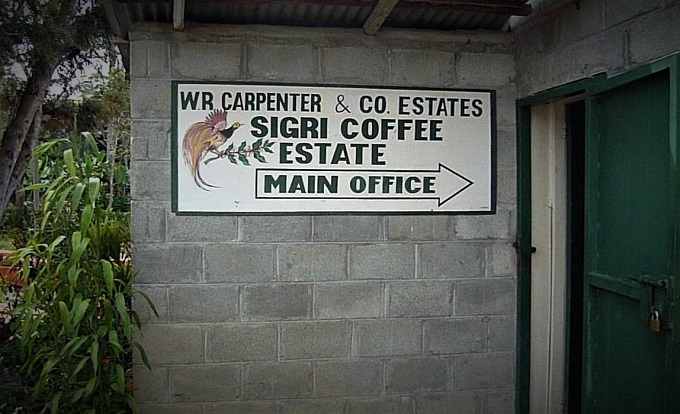
Sigri Estate, along with Bunum Wo and Kindeng,
make up the Carpenter Estates Group
Carpenter Estates have a very different approach, one that may sound more familiar to those who like to support fair trade and socially responsible coffee production. Coffee estates all over the world often organize themselves as integrated villages, providing workers with structure and services as well as housing. Each of the Carpenter Estates – Sigri, Bunum Wo, and Kindeng – takes care of the needs of its workers fully, providing a modest but distinctively modern lifestyle almost totally independent from the outside world. This is especially significant in PNG, where roads, electricity, and clean water are still rare privileges. Inside the gated compounds of the Carpenter Estates, residents have access to high-quality housing, communal markets, farms for produce and livestock, schools, doctors, and other social services which are partly self-organized, partly guided and funded by estate managers.
Carpenter Estates also strive to improve the sustainability of their operations by conserving water and encouraging bird habitat. In addition to coffee trees, they carefully manage the forests by inter-planting two types of native shade trees which promote very even ripening of coffee cherries while also providing habitat for over 90 bird species.
For Sigri, Bunum Wo, and Kindeng beans, search our coffee list for “Papua New Guinea”
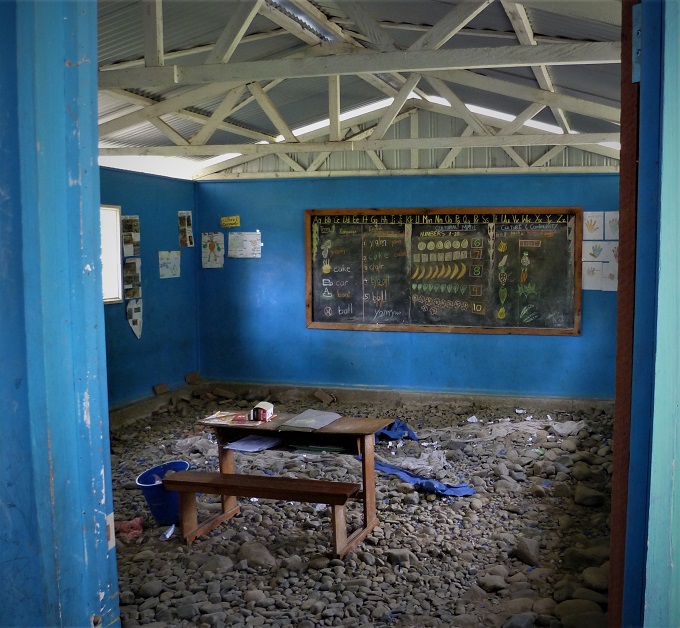
A view of Sigri Estate schoolhouse
All of the Carpenter Estates are nearby one another in the Wahgi Valley, which is one of only 3 places in the world where the finicky Blue Mountain cultivar can grow. The Kimel Estate (whose coffees we also carry) is a close neighbor.
The Highlands in the center of PNG are most definitely coffee country; it looks like every activity and infrastructure is directed primarily toward growing, harvesting, processing, and transporting coffee. The Highlands contain one significant city – Mount Hagen – which is the center of the coffee trade. Upon venturing out of the city, almost every sign of government or “civilization” in general quickly disappears. Electricity and running water are inconsistent; many get their water from rain collection. Roads are very poorly maintained, but sometimes kids fill the huge holes with rocks, and then collect change from grateful motorists. Adults work on the roads too, in the form of independent self-organized work crews; they typically maintain a short stretch of the road through their village and then demand tolls in return. Many villages have rudimentary flea market areas, but “businesses” as we think of them are non-existent; commerce is simply not a significant part of villagers’ daily lives. The coffee estates are an exception to the normal way of life, which still revolves around tribal villages and remains very isolated from the rest of the world.
In contrast to the small subsistence villages around them, each of the Carpenter Estates is home to thousands of people, full-time workers as well as some who participate only in the peak season (about 4000 total workers in peak season), plus all of their families. All of these residents have access to the social services of the estate, making it very appealing to any locals who may be longing for a different way of life.
Steep mountains create many micro-climates, weather and soil may change dramatically from one field to the next, and intimate knowledge of the land is vital to premium coffee production. At Carpenter Estates, workers whose families have been right there for many generations are capable of profound understanding and close relationship with the land and all plants that grow there. Jon observed that the overseers seemed to know personally every single coffee tree on the farm, and had an awareness of the individual needs of each, even though there are many thousands of trees in their care! They understand the particular soils in each corner of the mountainous landscape, the differences between the various strains of coffee in each plot, and exacting details of the care needed to improve the quality of the beans on each and every plant. This is knowledge passed down through generations, and creates a connection to place which is very meaningful (and very different than the perspectives held by most of us in the West).
Within each estate is a microcosm of overall PNG society. There are 3 main tribes that have claim to these lands: the Huli, Gogodala, and Meldpa. For millennia, their relationships to each other have been trying, sometimes violent and rarely commingled. This is typical of PNG’s 1000+ diverse cultures, and is fairly normal in traditional tribal societies in general. For Westerners, it may be easier to think of each tribe as more-or-less a village. Everyone is settled together in one place, sharing laws, language, spiritual beliefs, and agricultural practices. Neighboring settlements may contain different tribes with very different laws, languages, and practices, and these differences are still acutely felt when members of different tribes work together. On the Carpenter Estates, there are essentially 3 mini-villages to accommodate each of the tribes, but services like school and market are shared by all. In the fields, crews are made up of members of all 3 tribes, and they find ways to work together effectively, but split into their separate groups at the end of the day.
The special needs of these unique cultures do present challenges to efficiently running the estates, but managers have organized the workflow skillfully, and their extremely fastidious quality control coupled with expert processing proves that they have learned how to do it right. Each estate has independent fully functioning coffee production facilities – nursery, expert botanists, wet mill and drying patios. The one exception is that the 3 estates share a dry mill (used for final grading, sorting, and bagging of beans) for the sake of efficiency.
The mills on the estates have a very effective streamlined process that is running 365 days a year due to PNG’s perfect climate. Freshly harvested beans first enter the “wet milling” stage that sorts out the obviously bad beans and any sticks or debris, then the fruit is stripped off and clean beans soak in spring water for 12-36 hours to loosen any remaining fruit. Fancy pressure washers are used to fully wash the beans, and then they dry on patios until they reach the ideal 12% moisture, and finally go through “dry milling” to remove parchment and to be sorted by size. An extra step that is uncommon in other countries is to employ a large staff of real people (not automated machines) to closely inspect everything and pick out any remaining defected beans. This very precisely-controlled process leads to coffees that are clean, consistent, and far superior to many other coffees coming out of PNG.
The current owners are not the original founding family, as is often the case on well-established estates, but many of the managers have been born and raised in PNG (though they are of European/Australian descent) and they see their work as uplifting and benefiting the land and the people who live there. Not only are they creating sustainable agricultural practices with premium shade-grown coffee trees intermingled with native cloud forest species, but also running an enterprise that effectively increases access to the most beneficial aspects of modernization while still allowing locals to retain their traditional ways as they see fit.
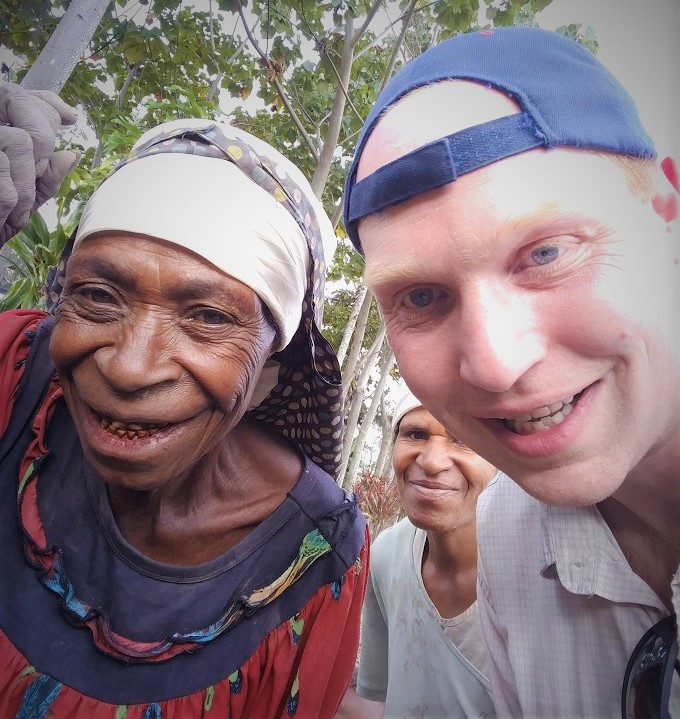
Jon made many friends at the Carpenter Estates!
Workers at the Carpenter Estates are proud to be a part of a thriving business as well as intimately connected with their lands. They were born on these lands, and they will die there just like countless generations of ancestors. On the other hand, the estates provide structure, security, income and material improvements like electricity and clean water, making for a much higher standard of living than in surrounding villages. For many of the workers, access to sanitation, health care, and education for their children are dreams come true. Although they still maintain an ancient connection to the land, they are very grateful for the prosperity and comforts that come with modern technology (even if their lives may appear impoverished and challenging from the perspective of a US citizen).
The secret to PNG coffee is the people who produce it. On the Carpenter Estates, ancient agricultural heritage and intimate connection to land and all the plants on it makes for exceptionally attentive growing, harvesting, and processing, and ultimately produces some of the best coffees on the market.
For Sigri, Bunum Wo, and Kindeng beans, search our coffee list for “Papua New Guinea”
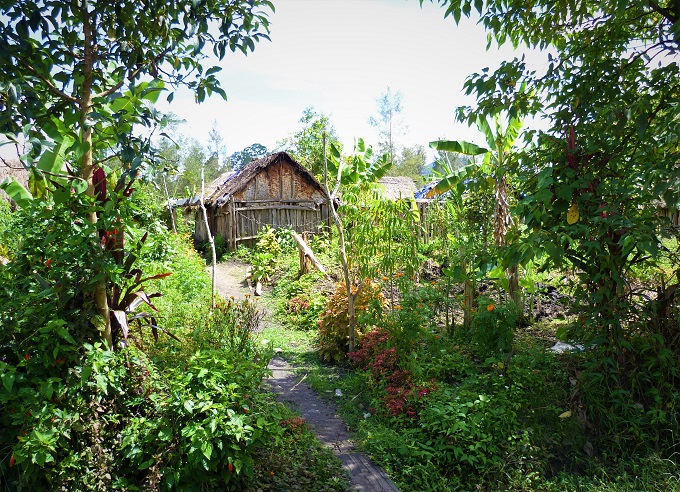
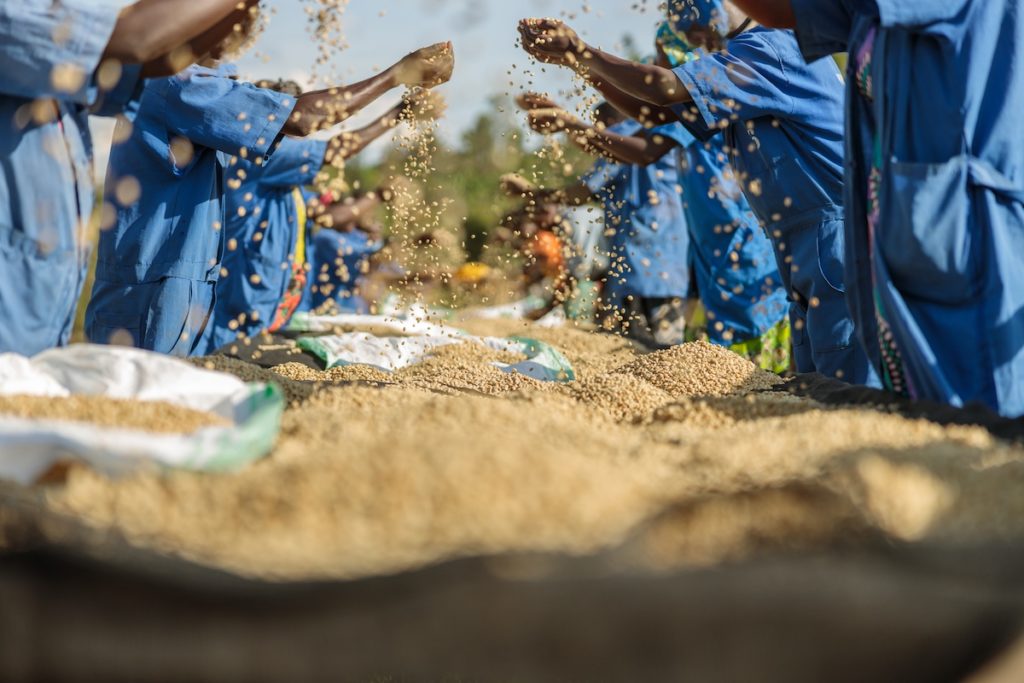
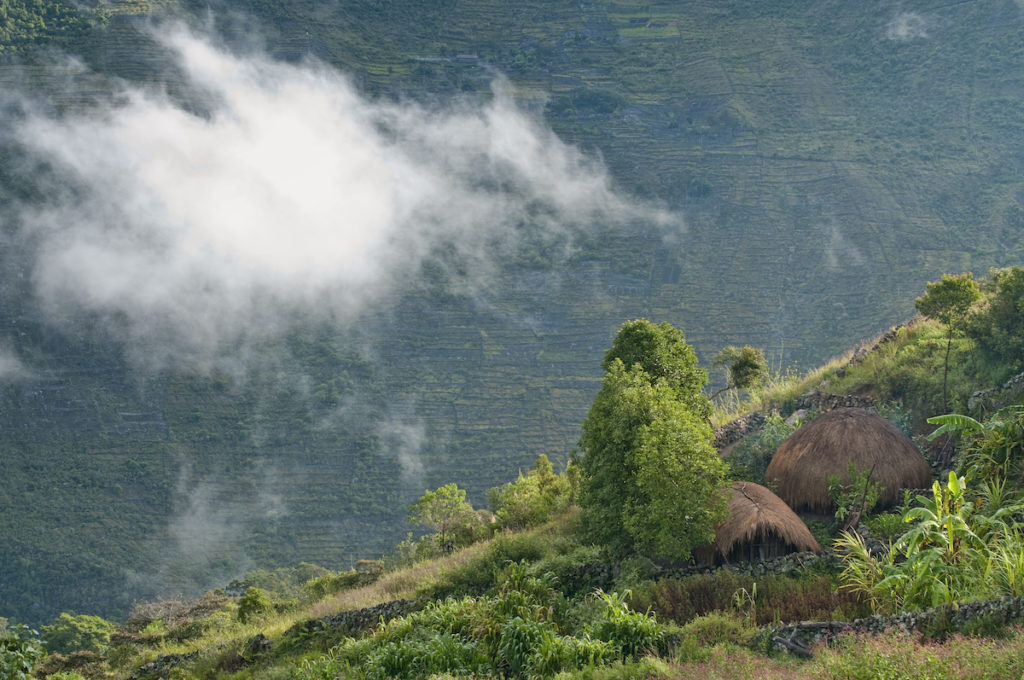

Love this coffee
You guys rock!